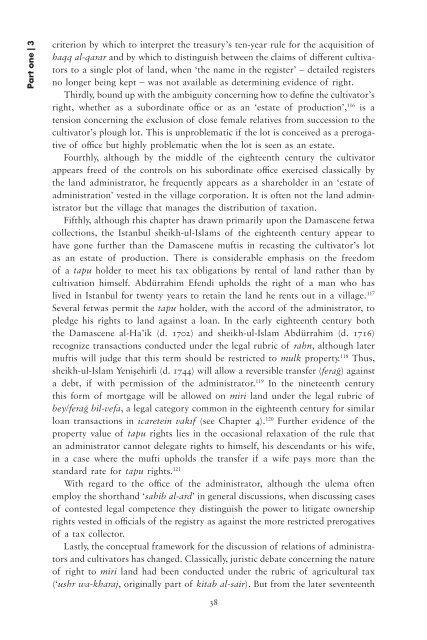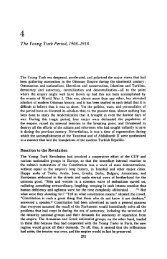Governing property, making the modern state - PSI424
Governing property, making the modern state - PSI424
Governing property, making the modern state - PSI424
You also want an ePaper? Increase the reach of your titles
YUMPU automatically turns print PDFs into web optimized ePapers that Google loves.
Part one | 3<br />
criterion by which to interpret <strong>the</strong> treasury’s ten-year rule for <strong>the</strong> acquisition of<br />
haqq al-qarar and by which to distinguish between <strong>the</strong> claims of different cultivators<br />
to a single plot of land, when ‘<strong>the</strong> name in <strong>the</strong> register’ – detailed registers<br />
no longer being kept – was not available as determining evidence of right.<br />
Thirdly, bound up with <strong>the</strong> ambiguity concerning how to define <strong>the</strong> cultivator’s<br />
right, whe<strong>the</strong>r as a subordinate office or as an ‘e<strong>state</strong> of production’, 116 is a<br />
tension concerning <strong>the</strong> exclusion of close female relatives from succession to <strong>the</strong><br />
cultivator’s plough lot. This is unproblematic if <strong>the</strong> lot is conceived as a prerogative<br />
of office but highly problematic when <strong>the</strong> lot is seen as an e<strong>state</strong>.<br />
Fourthly, although by <strong>the</strong> middle of <strong>the</strong> eighteenth century <strong>the</strong> cultivator<br />
appears freed of <strong>the</strong> controls on his subordinate office exercised classically by<br />
<strong>the</strong> land administrator, he frequently appears as a shareholder in an ‘e<strong>state</strong> of<br />
administration’ vested in <strong>the</strong> village corporation. It is often not <strong>the</strong> land administrator<br />
but <strong>the</strong> village that manages <strong>the</strong> distribution of taxation.<br />
Fifthly, although this chapter has drawn primarily upon <strong>the</strong> Damascene fetwa<br />
collections, <strong>the</strong> Istanbul sheikh-ul-Islams of <strong>the</strong> eighteenth century appear to<br />
have gone fur<strong>the</strong>r than <strong>the</strong> Damascene muftis in recasting <strong>the</strong> cultivator’s lot<br />
as an e<strong>state</strong> of production. There is considerable emphasis on <strong>the</strong> freedom<br />
of a tapu holder to meet his tax obligations by rental of land ra<strong>the</strong>r than by<br />
cultivation himself. Abdürrahim Efendi upholds <strong>the</strong> right of a man who has<br />
lived in Istanbul for twenty years to retain <strong>the</strong> land he rents out in a village. 117<br />
Several fetwas permit <strong>the</strong> tapu holder, with <strong>the</strong> accord of <strong>the</strong> administrator, to<br />
pledge his rights to land against a loan. In <strong>the</strong> early eighteenth century both<br />
<strong>the</strong> Damascene al-Ha’ik (d. 1702) and sheikh-ul-Islam Abdürrahim (d. 1716)<br />
recognize transactions conducted under <strong>the</strong> legal rubric of rahn, although later<br />
muftis will judge that this term should be restricted to mulk <strong>property</strong>. 118 Thus,<br />
sheikh-ul-Islam Yenişehirli (d. 1744) will allow a reversible transfer (ferağ) against<br />
a debt, if with permission of <strong>the</strong> administrator. 119 In <strong>the</strong> nineteenth century<br />
this form of mortgage will be allowed on miri land under <strong>the</strong> legal rubric of<br />
bey/ferağ bil-vefa, a legal category common in <strong>the</strong> eighteenth century for similar<br />
loan transactions in icaretein vakıf (see Chapter 4). 120 Fur<strong>the</strong>r evidence of <strong>the</strong><br />
<strong>property</strong> value of tapu rights lies in <strong>the</strong> occasional relaxation of <strong>the</strong> rule that<br />
an administrator cannot delegate rights to himself, his descendants or his wife,<br />
in a case where <strong>the</strong> mufti upholds <strong>the</strong> transfer if a wife pays more than <strong>the</strong><br />
standard rate for tapu rights. 121<br />
With regard to <strong>the</strong> office of <strong>the</strong> administrator, although <strong>the</strong> ulema often<br />
employ <strong>the</strong> shorthand ‘sahib al-ard’ in general discussions, when discussing cases<br />
of contested legal competence <strong>the</strong>y distinguish <strong>the</strong> power to litigate ownership<br />
rights vested in officials of <strong>the</strong> registry as against <strong>the</strong> more restricted prerogatives<br />
of a tax collector.<br />
Lastly, <strong>the</strong> conceptual framework for <strong>the</strong> discussion of relations of administrators<br />
and cultivators has changed. Classically, juristic debate concerning <strong>the</strong> nature<br />
of right to miri land had been conducted under <strong>the</strong> rubric of agricultural tax<br />
(‘ushr wa-kharaj, originally part of kitab al-sair). But from <strong>the</strong> later seventeenth<br />
38












